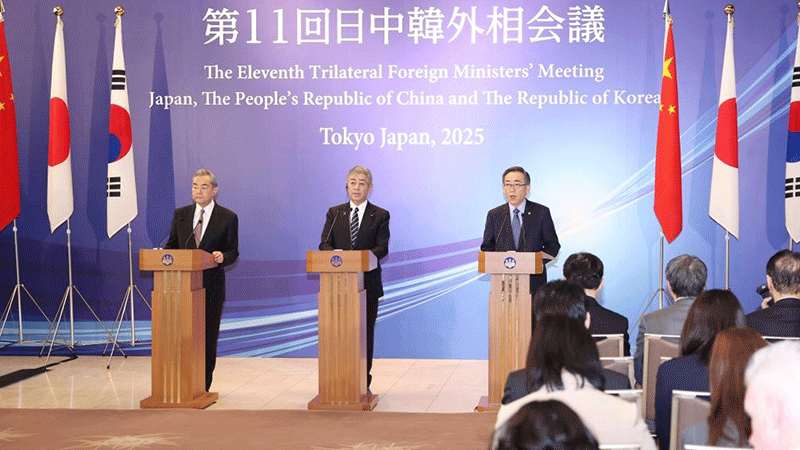 |
Chinese Foreign Minister Wang Yi (left), also a member of the Political Bureau of the Communist Party of China Central Committee, meets the press together with Japanese Foreign Minister Takeshi Iwaya and the Republic of Korea (ROK) Foreign Minister Cho Tae-yul after attending the 11th China-Japan-ROK Trilateral Foreign Ministers’ Meeting in Tokyo, Japan. --Photo Xinhua |
China, Japan, ROK agree to enhance trust, cooperation; Saturday’s gathering sets the tone for further trilateral cooperation, says expert
(Global Times) -- The top diplomats from China, Japan, and South Korea agreed that against the backdrop of a complex and turbulent international landscape and sluggish recovery of the world economy, it is necessary and responsible for the three sides to further strengthen communication, enhance mutual trust, deepen cooperation, and provide more stabilising factors for regional peace and development, Chinese Foreign Minister Wang Yi, also a member of the Political Bureau of the CPC Central Committee, said in Tokyo on Saturday.
Wang made the remarks while meeting the press together with Japanese Foreign Minister Takeshi Iwaya and the Republic of Korea’s Foreign Minister Cho Tae-yul after attending the 11th China-Japan-ROK Trilateral Foreign Ministers’ Meeting, according to Xinhua News Agency.
China-Japan-ROK cooperation is one of the most deeply rooted, highly institutionalized, and promising cooperation frameworks in the East Asian region, Wang said. Over the past 20 years, trilateral efforts have yielded positive results, advancing development in all three countries and contributing to regional stability and economic integration.
Facts have shown that the deeper the three-way cooperation, the stronger the ability to withstand risks and the more solid the foundation for development, Wang said.
This year marks the 80th anniversary of the victory of the Chinese People’s War of Resistance Against Japanese Aggression, the three countries should reaffirm the consensus of “facing history squarely, and looking toward the future,” and promote China-Japan-South Korea cooperation to achieve the effect of “1+1+1>3,” benefiting the three countries, the region, and the world, Wang noted.
Da Zhigang, director of the Institute of Northeast Asian Studies at Heilongjiang Provincial Academy of Social Sciences, said Wang’s remarks show trilateral cooperation is extending beyond Northeast Asia to broader regional engagement.
Da added that at a time of global uncertainty, the three countries’ consensus on peace and future cooperation boosts both regional stability and broader Asia-Pacific confidence.
Xiang Haoyu, a research fellow at the China Institute of International Studies, said the push for a trilateral free trade deal was a key highlight of the talks.
According to Wang, the three agreed to continue to communicate on restarting the negotiations on the trilateral free trade agreement, promoting the expansion of the Regional Comprehensive Economic Partnership, and maintaining the stability and smoothness of regional production and supply chains, Xinhua reported.
Xiang said the talks are expected to spur the three countries to resume negotiations and speed up progress on the free trade agreement.
Consensus on regional supply chains, technological innovation, and the development of new quality productive forces, is also expected to inject new momentum into economic and trade cooperation among the three countries, he noted.
The three sides also agreed on enhancing multilateral cooperation, by strengthening coordination and cooperation under mechanisms such as ASEAN Plus Three and the East Asia Summit, promoting “Trilateral+X Cooperation” to the surrounding areas, and driving common development in the region. “We will support each other in hosting APEC meetings, promote open regionalism, uphold multilateralism and free trade, and push for a more universally beneficial and inclusive economic globalisation,” Wang said.
(Latest Update March 24, 2025) |